- Home
- Andrew McGregor
Bloody Citadel Page 2
Bloody Citadel Read online
Page 2
Private Udet
Udet is twenty-two and from Potsdam, a suburb of Berlin and also a member of the now non-existent 76th Infantry Division. Having recently joined the unit as a new soldier, he was assigned to the southern front of Stalingrad with Leutnant Hausser. His loyalty and close proximity to the officer enabling his survival.
‘Hase’
Little is known about this soldier. A Russian ‘Hilfswilliger’ (‘Hiwi’ for short) or volunteer that grew up in Kiev. He has been with Hausser for some time and it is currently uncertain exactly where they originally joined forces, but this probably occurred in the Crimea. At 28, he is a year older than the commander, and seems to respect him immensely, displaying considerable loyalty.
Sergeant Moretti
Donatello’s immediate commander, Sergeant Moretti, was instrumental in ensuring the younger Italian’s survival and escape from the Don Bend. Having a fondness for the younger soldier, the older Italian volunteered them both for specialist liaison duties when the opportunity presented itself, his knowledge of German, Italian and Russian assisting them in being assigned to Leutnant Hausser’s unit shortly afterwards. Unfortunately, Donatello was killed helping a wounded German soldier back from a firefight in woodland, Moretti still grieving for the youngster and his brother’s demise.
Grossdeutschland Division
Major Wolff
An officer in the above unit, the Major first met Leutnant Hausser and his men by chance after a firefight. Moving north to fly back to his unit after attending final briefings at Field Marshall Erich von Manstein’s headquarters, he quickly assigned Hausser and his men to his own division, flying back to the north by Fiesler Storch the next morning after a brief meeting. Little is known about this commander, but as Hausser promptly stated to Tatu at the time, ‘Anything was better than the idiot they were with at the time.’
2nd SS Panzer ‘Das Reich’ Division
SS-Stabsscharfuhrer Adlan Meier
A Tiger I commander in ‘Das Reich’ division, Meier and his crew were part of the forward advance of the division towards the western outskirts of Kharkov. Reaching the city, they fought their way to a virtually impassable tank ditch, substantial casualties inflicted by the defending Russian pak guns, dug in tanks and infantry before Luftwaffe Stukas were summoned to obliterate the defences. A confirmed National Socialist and indoctrinated with the beliefs of the regime, he and his company now sit on the south side of the salient, occasionally engaging in artillery and tank skirmishes with the enemy.
Luftwaffe:
Ernst Brandt
A seasoned flyer with the German Air Force, Ernst has experienced exceptional luck to compliment his flying ability. Having to spend three months flying to intercept the enemy bombers above Germany, he is once again to be transferred back to the Russian Front, the dramatic realisation of a turning tide from the bitter air war over his country affecting him deeply. Relieved to be returning to the front and avoid the distressing endless streams of heavy bombers dropping their deadly cargo over German cities and factories, he is more than willing to combat the Red Air Force once more, determined to prove his worth and avoid another placing in the skies above a home country he now doubted for the first time would win the war.
Sergeant Erwin Stein
A sergeant in the parachute regiment or Fallschirmjagers, Stein has met Leutnant Hausser only once, intervening in a village with the commander of SD troops that were shooting civilians. A young soldier of principle, he had radioed Army Group South’s headquarters for permission to intervene, fortunate to receive a reply from a high ranking Luftwaffe officer, his small group of men acting in conjunction with Leutnant Hausser’s small squad prevented several deaths, the intervention unfortunately too late for some. He is now en-route to Italy with his unit by train, the deteriorating situation in Africa demanding additional troops to be deployed to the allied peninsula in defence.
Russian Army
Captain Medvedev
A captain in the Russian army, Medvedev has met Leutnant Hausser twice, once south of the city of Stalingrad when the German officer outwitted him and again south of the factory district. After some time in a penal battalion, he mysteriously regained his rank as captain, being decorated for mercilessly storming the last remaining German positions within the Red October Factory in the north of the city.
Having been deployed to the Kharkov area, he faced two major German advances, receiving wounds before escaping to the north east when unable to get back into the surrounded city. It is believed Hausser may once again have glimpsed the man in the distance as the Russian took flight with his men.
His current whereabouts are unknown, with scattered Russian units still being captured and eliminated, he is presumed missing or killed in action.
Partisans
Pavel
A young Red Army infantryman, Pavel was cut off in the initial German advance northwards, hiding and luckily escaping patrols until joining up with partisans in the many forests dotted across the land. It now seems he will remain fighting behind the lines for the foreseeable future as the invaders strengthen their positions further east and north.
Oleg
Cut off with Pavel, his younger countryman, Oleg is in his early twenties, seeking cover from the Wehrmacht as they swept Russian units aside during the Kharkov counter offensive. Now also in hiding, he and his younger friend are joining the fight behind the lines against the fascist invaders, both having been the perpetrators of Donatello’s death.
Fighting to defend their forest shelter against SS backed troops, both young men were cut off from the other partisans and are on the run or captured…facing an uncertain future many kilometres behind the front line.
Mishka and her father
Local residents of the eastern Ukraine, both are assisting the local partisans, gathering food and ammunition from local residents to supply the hiding soldiers. Having been stopped and checked by Leutnant Hausser and his squad the night before the offensive commenced, they were instrumental in the German squad’s survival, realising the lone patrol would soon be located and destroyed. This timely intervention had an ulterior motive, to also prevent Udet from locating a hidden cache of grenades and supplies in the back of their cart.
Fighting to defend their forest hideaway as the Germans advanced ruthlessly, Mishka is now on the run with her father, suspected as being executed by attacking Einsatzgruppen troops and Cossacks.
Introduction: April 8th 1943: The Railway Children
Leutnant Hausser glanced up at the grey overcast sky, speck of rain beginning to fall across the cement before him as he trudged along the street, the nails on the under soles of his boots clicking across the tarmac. With a clean uniform and his shoulder wound nearly healed, he nodded to several Wehrmacht soldiers on the opposite side of the street, the four men sitting outside a café, a half empty bottle of wine on the table. Several cars trundled past, the drone of their engines and plumes of exhaust behind making him smile, his hand reaching to the lip of the officer marked field cap as he moved to the side to allow three middle aged ladies to pass, the women smiling thoughtfully at the young soldier.
Pedestrians were in rising numbers, people venturing out for some shopping or simply a walk as they became confident of the aerial silence, the lack of recent raids on the city a reflection of the dramatic increase in anti-aircraft batteries in the surrounding areas and an escalation in Luftwaffe fighter strength. Gramophone records played from several of the retailers as he passed a tailors and bakers, then a draper’s shop the numerous cloths and curtains displayed in the bright window.
With another café ahead, he passed a beer cellar, muffled singing coming from within causing him to smile, a number of soldiers and Kriegsmarine sailors back on leave from the front and relieving their stress with the local brew. A dray horse and wagon sat in the distance, the local brewery delivering to another cellar and café further up the narrow street. The two and three storey grey buildings on either side were relatively drab bu
t for several red flags adorning their windows and fronts, the decorations outside a barber’s and butcher’s shops adding to the café culture, the preparations for the Fuhrer’s birthday in twelve days’ time progressing under close supervision from local party officials. Workmen on ladders were hanging bunting between the ornate lampposts and upper windows, an Opel Blitz lorry parked further down the street on the right laden with official flags of varying sizes and brightly coloured hanging cord.
Hausser grinned as he approached a familiar corner, the narrow side street leading to somewhere he came regularly as a boy, the warm aroma of baking bread drawing him there on the way from school and the engineering shop, the owner providing cheaper bread from the morning after the front shop closed. He and two other boys would regularly loiter at the back door, hoping to be invited in, the warmth and jovial attitude of one of the baker’s assistants always cheering and exciting the two or three boys as he reminisced of his exploits in the last war.
Nervously stepping down the lane, his eyes ran across the familiar stained brick walls, water dripping from drainpipes, a smile sweeping across his features as he glimpsed the one broken pipe opposite the rear bakery door, the boys having often kicked rain water at each other whilst they waited patiently. The dirt covered cobblestones were placed at a slight slope on either side, allowing for drainage from rain and spillages to flow into the sewers through grilles in the centre. Steps descended into basement entrances along the alleyway on either side, the worn and flaking doors next to raised delivery hatches, a number of wooden single trolleys leant against the walls.
The buildings stretched for over a hundred metres on either side, the lane for deliveries to small tool and engineering workshops and a seamstress at the end, the small frontal shop facing out into the next street. Stopping briefly, he reminisced at the fight he had once had here, the bloodied nose and blackened eye he had received from two older boys from the neighbouring district, the baker’s assistant emerging as he slumped to the cobblestones. His face had been crimson with embarrassment as the older man had shouted and waved his fist at the other boys, the youths running off laughing as the old soldier helped him to his feet, his shorts and shirt soaked and smeared with dirt, the man stifling a chuckle at his obvious discomfort. His eyes welled with emotion as he recalled he had been quickly ushered into the main bakery, the heat from the two ovens warming his battered youthful pride as a hot strudel was thrust into his eager hands, his pain instantly forgotten.
His eyes welled further as he recalled his return home from Russia the previous week, some five days ago, his mother dropping distraught to the floor as she opened the door, a telegram having announced his probable demise in the fall of Stalingrad having been delivered nearly a month earlier. She had cried virtually all evening, his father silent with emotion as they hugged tightly, then hugged the companion he brought with him. The soldier seemed unable to understand their words of gratitude as Hausser explained how the man had probably saved his life on a number of occasions, the small wire haired terrier jumping excitedly around them as Hase lowered the dog to the floor.
Sitting by a blazing fire in the small living room, his mother had prepared food in the kitchen, a lavish feast with the meagre resources available, his father improvising and tethering his new four legged companion with a strand of cord before venturing out, taking Reichmarks and ration coupons to gain some extra food and drink. Returning with sweet wine and beer to celebrate, the older man limped into the house with the dog dancing excitedly round his feet, brandishing several wild boar sausages and steaks triumphantly as well as the fond wishes and compliments of the neighbours and local tradesmen. Hausser had offered to donate some of his own limited funds, but this had been refused outright.
Hase had been shooed from the kitchen several times, his eagerness to assist in the food preparation denied as Hausser’s father explained in broken Russian that his wife was a proud cook and would never accept help. Then the older man’s eyes had darkened as they sat sipping from the drinks, explaining his son’s return was warmly welcome, but that it had unfortunately renewed the grief and faint hope amongst some of the neighbours, for the lives of their own offspring still missing in the vast burial ground of the Sixth Army far to the frozen east.
The three men had sat in silence for some time before Hase once again attempted to venture into the kitchen, this time chased away and threatened in jest with a knife as the dog barked furiously at him, the Hiwi reluctantly sitting back down to sip his beer in silence as Hausser and his father chuckled. They had eaten well around the family table, candles flickering as they drank and laughed, avoiding discussing the war and explaining Hausser’s antics and experiences as a boy in fond remembrance. His father had then tried to draw some information from Hase, the Russian realising that the older man had spent some time in Kiev during the previous war before advancing further into the eastern hinterland.
The evening conversation had slowly begun to falter as war once again filled their minds, the strain of attempting to avoid the subject after the mentally dulling effect of the alcohol providing too much. Eventually, with the assistance of Hausser and his father’s translation, his mother had asked after Hase’s parents, the young Russian explaining in detail that his own father had fought in the previous war and had then the revolution. The subject then moved comfortably to either families’ existence to find they were both actually quite similar, the apartments in suburbs of big cities and their fathers working in related fields, albeit Hase’s assisting an old war friend and neighbours by delivering coal and wood in the evenings, where as Hausser’s father would deliver extra bread to the elderly neighbours.
The evening had slowly drawn to a close, Hase whispering to Hausser’s father furtively as the officer assisted his mother carry the dishes into the small kitchen, the two men staring back into the fire and talking in lowered voices. Then his father had stiffened suddenly in surprise, calling his son and wife back into the living room hurriedly, the two standing in the doorway as his father’s eyes glistened in the firelight, his hand pointing to his son as he stammered in pride, ‘Y-You have the Iron Cross?’
Leutnant Hausser shook his head to move his thoughts back, smiling and glancing across the drab brick walls once more and suddenly realising something he could do in the next couple of days, a satisfied grin forming across his lips as he stepped forward, the rain drizzle beginning to fall across his shoulders and field cap. Descending the four steps nervously, he hesitated before raising his hand to knock on the wooden door, the glimmer of light shining above near the top of the frame, a medium serving hatch situated in the worn planked surface.
Then he knocked twice, some muffled shuffling inside, a rusted bolt drawn, the hatch pulled inwards as a wave of warm air swept across his features, the aroma of baking bread surging into his nostrils. The elderly man wiped his sweat soaked brow and eyes with the lower half of his apron, his grey hair drenched beneath a small white cloth cap. Straining his eyes without his glasses, the baker stared at the figure before him, stiffening slightly as he glimpsed the field grey uniform and darkened collar, his vision seeing the top of a red ribbon on the chest and smiling knowingly at the decoration. Curt Messner’s face lightened further as he suddenly recognised the twenty seven year old before him, his palm wiping across his apron before extending towards the junior officer, a broad smile sweeping across his face, ‘Karl Hausser…my boy, you have returned to us alive! I heard a rumour…’ Tears of joy filled the older man’s eyes as they shook hands vigorously through the hatch, the door opening slowly, ‘Come inside…let me make some bread for you and your mother and father…we will have some schnapps whilst it is in the oven!’ The door swung fully open, the bakers hand grasping Hausser’s arm tightly as he whispered to his ear, guiding him indoors with a heavy limp, ‘You must tell me of the war in the east…is it really as bad as we all think? So many young men are not coming back…’
Leutnant Hausser stared up at the tall chalked timetabl
e, the large busy station ticket hall full of mostly soldiers and navy personnel, a couple of Luftwaffe ground crew and Panzer crewmen queuing to show their travel permits. The large hall was showing the signs of war, scuffed boot marks on the once pristinely polished crème floor tiles, designated sections of the walls littered with divisional and personal notices for returning soldiers, some of personal pleas from distraught parents or lovers, a vain hope a returning soldier may know of the location or fate of the missing. Several posters to instil morale were also placed across the scuffed tiled walls, colourful images of the armed services and phrases to motivate along with warnings of spreading defeatism or talking too loudly in public of the military situation.
Military policemen patrolled the platforms and stood scrutinising the assembled throng next to the glass ticket booths, ready to intercept and arrest anyone that had overstayed their permitted furlough. More soldiers were entering the station dusting the drizzle from their overcoat shoulders and muttering about the weather. All were drawn to the afternoon trains and their reluctant return to the fronts across Europe and beyond, many holding their furlough orders, keen to demonstrate that they were making personal efforts to follow their instructions.
Considering the route they would take from the departures indicated above him, Leutnant Hausser glanced across several possible trains, considering his experience on the one previous furlough. Discounting two possibilities due to how busy the train cars would be, the stops potentially drawing further men to them as they joined connections beyond in other stations, he finally committed to an indirect route. He turned, winking at the expectant Hase, ‘We have three changes as last week, then we should be on the train back east…all the way to Kiev…it’s the central distribution point for Army Group South and Centre.’ Both soldiers stood in virtually immaculate uniforms, their chests covered by open fleeced military jackets, Hausser’s mother fussing over any repairs and his father providing full backpacks of tinned food and rations, his son suspicious as to how much the older man had spent to gain such a quantity in times of such shortages, his father telling him to simply mind his own business.

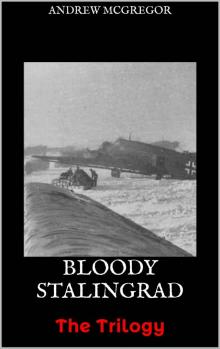 Bloody Stalingrad
Bloody Stalingrad Wargames of the Everworld
Wargames of the Everworld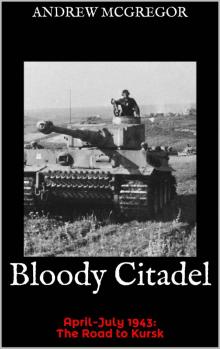 Bloody Citadel
Bloody Citadel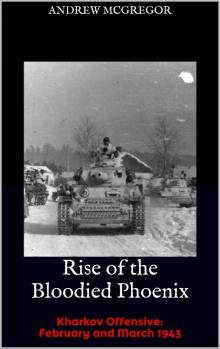 Rise of the Bloodied Phoenix
Rise of the Bloodied Phoenix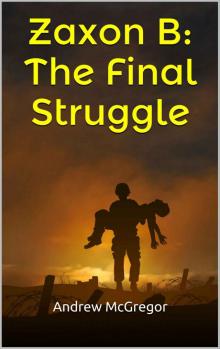 Zaxon B: The Final Struggle (Galaxies Collide Book 4)
Zaxon B: The Final Struggle (Galaxies Collide Book 4)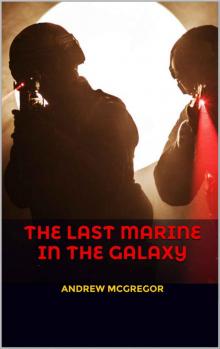 The Last Marine in the Galaxy (Galaxies Collide Book 1)
The Last Marine in the Galaxy (Galaxies Collide Book 1) Planet Genocide II: Galaxies Collide 5: Onslaught
Planet Genocide II: Galaxies Collide 5: Onslaught